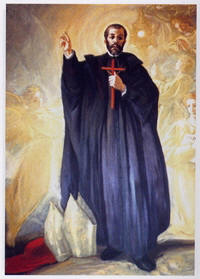According to
RomeReports, St John of Avila is being considered for the honour of Doctor of the Church.
This would be most interesting since he was a friend of St Teresa of
Avila and
St John of the Cross, and is very much in the tradition of Spanish mysticism.
He is not very well known outside of
Spain, yet his writings have been highly influential, particularly in the areas of mystical theology and spirituality.
A number of years ago the Spanish bishops petitioned to have the honour conferred on the Saint and in 2006
they announced that their request was going to be granted.
St John was born in Almodovar del Campo, Spain, in 1500. He studied law in Salamanca, but he was not impressed with jurisprudence, so he went home for a long think. For three years he lived an ascetic life until a Franciscan friar who was passing through Almodovar suggested he go and study theology. Taking up the suggestion he went to Alcala, and as he did so discovered a vocation to the priesthood. His parents died during his seminary years. Ordained priest, he sold his inheritance and began making arrangements to go on the missions to America, however God had other designs: he was indeed to be a missionary, but in his own land - a far tougher assignment. Before the boat left his preaching ability came to attention of the Archbishop of Seville who asked him to become a missionary in Andalusia. Seeing the movement of the Holy Spirit in this, he said yes and began his life as an itinerant preacher in Spain.
St John's sermons brought thousands back to the practice of the faith while gaining him many enemies. He was sought after for his spiritual direction and advice, among those who sought his help and advice were St Teresa of Avila, St John of the Cross and St Francis Borgia. His enemies made false accusations against him and he was brought before the Inquisition, but his innocence was quickly established and the Inquisitors invited him to preach at the Church of San Salvador in Seville confounding his critics and delighting the ordinary people who loved him. After forty years of preaching he died in Montilla in 1569. He was canonised by Pope Paul VI in 1970. His many works, sermons and letters were published in the 17th century and are still available today. So St John is a worthy candidate for the honour of Doctor.
I still look forward to the same honour being conferred on St Louis-Marie de Montfort – I believe a number of submissions have been made on his behalf.
And of course another worthy candidate is St Veronica Giuliani, the great Italian mystic and stigmatic who has left us remarkable writings: the bishops of
Umbria have already petitioned for the honour to be conferred on her.
All that said, I wonder what chance St Faustina Kowalska would have?
I believe St Bernadine of
Siena is also being considered – I think they have been studying his writings for some time now – the original petition requesting his inclusion among the Doctors was submitted in 1882, so I suppose it is early days yet!
The report says Pope Benedict may declare St John a Doctor at World Youth Day this year – I doubt it somehow – he may announce that he will declare him a Doctor, just as Blessed John Paul announced his intention to confer the honour on St Therese at World Youth Day in Paris.
I would imagine, though, that a separate ceremony would be held in
Rome.
But then Pope Benedict is his own man.
Interestingly, the Holy Father did not include St John of Avila in his recent Wednesday catechises.



